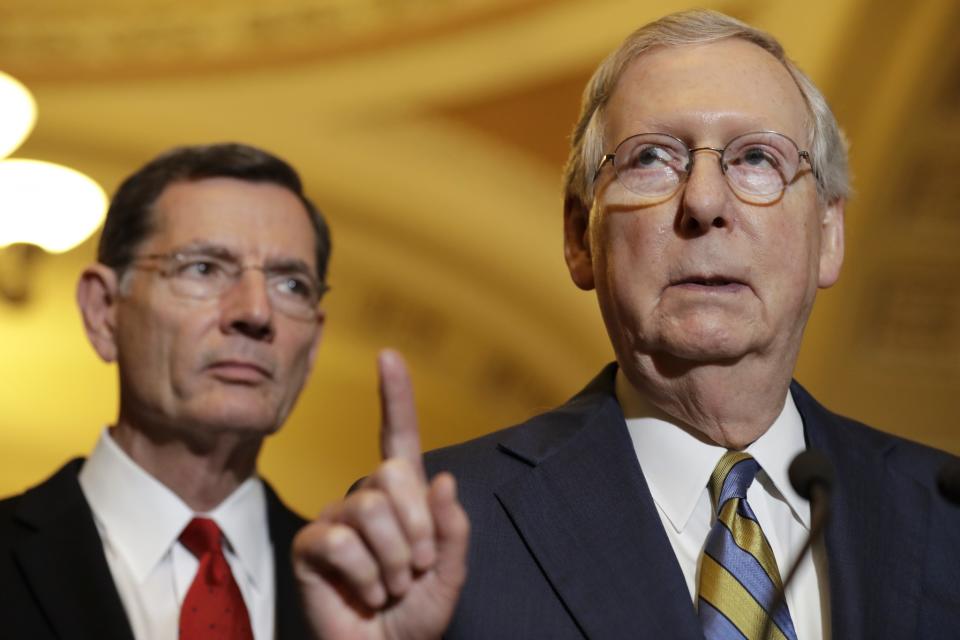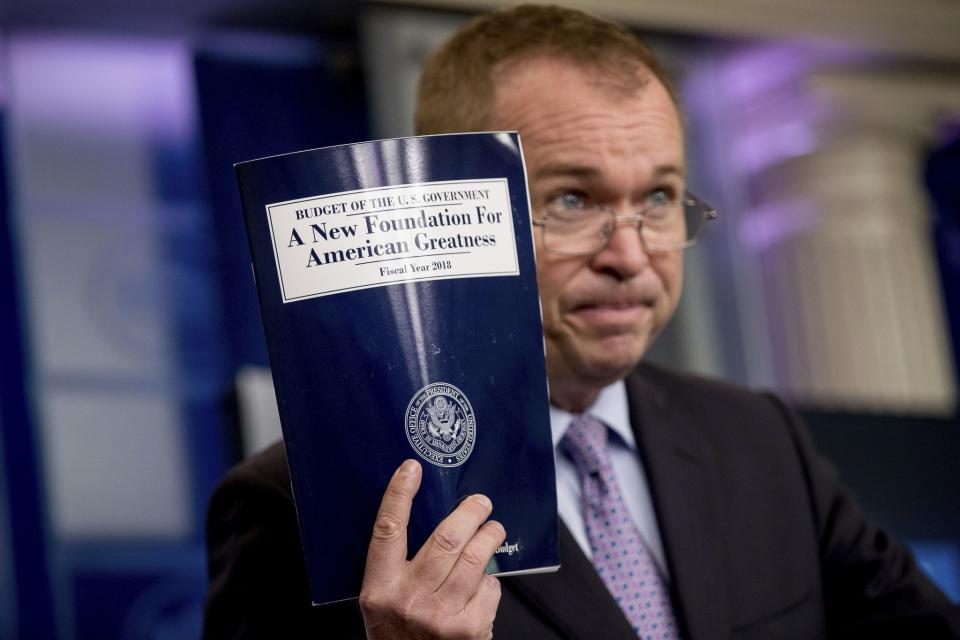Republicans and Democrats dismiss Trump’s budget as ‘dead on arrival’
WASHINGTON — President Trump formally rolled out his 2018 budget plan Tuesday, and lawmakers from both parties wasted no time in pushing back, with many proclaiming it “dead on arrival” and arguing that the proposal goes against many of Trump’s campaign-trail promises.
“The president’s budget isn’t going anywhere,” said Sen. Bill Cassidy, R-La. Cassidy added that “Trump’s campaign contract with the American people should be fulfilled” by keeping health care costs low, something he said the budget does not do.
“This budget exposes all of that verbiage for what it really was, just cheap and empty campaign rhetoric that was meant to get votes,” said Sen. Bernie Sanders, the top Democrat on the Senate Budget Committee.
Trump’s budget calls for sweeping cuts to the social safety net, slashing $800 billion from Medicaid over 10 years in conjunction with a health care bill approved by the U.S. House of Representatives earlier this month. Other programs designed to combat poverty, ranging from food stamps to Social Security Disability Insurance, would also see their funding slashed. The document calls for a bevy of tax cuts as well.
Mick Mulvaney, Trump’s budget director, claimed that the budget is designed to decrease waste in government spending, spur greater economic growth and erase the federal deficit within 10 years.
“We looked at this budget from the eyes of the people who were actually paying the bills,” Mulvaney told reporters Tuesday. “For years and years we looked at the budget in terms of those on the back end of the programs, the recipients of the taxpayer money. We haven’t spent nearly enough time focusing on the people paying the taxes.”
But the proposal has met skepticism from Congress, with both Democrats and Republicans noting that the budget is a step away from statements Trump made while running for president. Among other things, Trump assured voters that there would be no cuts to Medicaid under his administration.
I was the first & only potential GOP candidate to state there will be no cuts to Social Security, Medicare & Medicaid. Huckabee copied me.
— Donald J. Trump (@realDonaldTrump) May 7, 2015
“[The budget] is once again an example of the rhetoric of the campaign not matching up with the reality of governance,” said Sen. Martin Heinrich, D-N.M., who noted that the budget hit rural areas, such as his home state, particularly hard.
Sanders further called the plan “immoral,” while Senate Minority Leader Charles Schumer, D-N.Y., slammed the budget for giving tax breaks to the wealthiest Americans.

“The Trump budget takes a sledgehammer to middle class and working class Americans, lavishes tax breaks on the wealthy and imagines all the deficit problems away with fantasy math,” he said.
Republican lawmakers also distanced themselves from the budget, insisting that they would move forward with their own appropriations plan. Sen. John McCain, R-Ariz., panned the proposed defense spending as unacceptably low and labeled the overall budget plan as “dead on arrival” in Congress.
WH $603B defense budget is inadequate to challenges we face, fails to rebuild military & dead on arrival in Congress https://t.co/8Vcp9fVRhn
— John McCain (@SenJohnMcCain) May 23, 2017
Even Senate Majority Leader Mitch McConnell, R-Ky., described the proposal as merely a “recommendation.”
“We’ll take things into consideration and move forward,” McConnell said.
It is common for a president’s proposed budget to meet pushback. Many of President Barack Obama’s budget plans sputtered in Congress, where the House was controlled by Republicans after 2010.
“Almost every president’s budget proposal is basically dead on arrival, including President Obama’s,” Sen. John Cornyn, R-Texas, the No. 2 Republican in the Senate, said, according to NBC News.
Members have said there are elements of the Trump budget that they can work with, however. McConnell touted Trump’s plans to increase defense spending, allowing the U.S. to add over 56,000 service members in 2018. Multiple lawmakers cheered the White House’s decision to reverse course and fund the Office of National Drug Control Policy, which supporters say is critical in the fight against opioid addiction.

Even Sanders said he would be willing to work with the president on a proposed $25 billion plan to provide workers with up to six weeks’ paid leave to care for the birth of a new child.
“[Paid family leave] is a good thought, but it is totally inadequate in terms of its funding,” Sanders said.
But any paid family leave proposal faces an uncertain future in Congress. Mulvaney acknowledged that while he had been skeptical of paid family leave in his time in the House, it was a major piece of Trump’s plan to stimulate economic growth.
“We try and create the environment where people are more comfortable going back to work and staying at work knowing that if they do have a child, they’ll be able to spend time with that child,” Mulvaney said.
Mulvaney will get to make his case at length soon. He’ll defend the proposal at hearings before House and Senate budget committees on Wednesday and Thursday, respectively.

Schumer advocated shutting the White House out of the appropriations process altogether and said the proposal “was something you’d expect from someone rooting for the government shutdown.”
Instead, Schumer said Congress would be better served acting as they did last month, when he said a bipartisan effort helped avert a government shutdown.
“The way we can reach a funding agreement in September is to do what we did last month: work together on a bipartisan basis … and tell President Trump and Mick Mulvaney to stay out of the process and come up with a plan.”
Read more from Yahoo News:
‘The most horrible feeling’: Mother of missing Manchester concertgoer describes chaos of attack
Pentagon report shows Flynn misled investigators about Russia trip
‘Operation Git-Meow’: The mission to save Gitmo’s feral cats
As Iraqi forces close in on ISIS and Mosul, civilians are still caught in the crossfire
Photos: Deadly blast at Ariana Grande concert in Manchester, England


